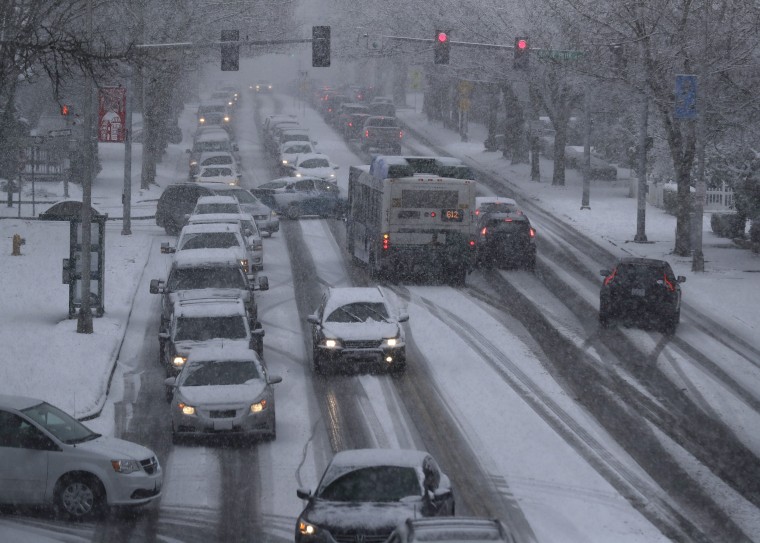SEATTLE — Residents of the Pacific Northwest took to neighborhood hills with skis, sleds or even just laundry baskets Saturday to celebrate an unusual dump of snow in a region more accustomed to winter rain.
Some areas received more than a foot of snow, and meteorologists say more is on the way early next week. Hundreds of flights were canceled in Seattle and Portland, and heavy snow drifts closed major highways in eastern Washington. Around 50,000 people lost power.
Residents cleared out grocery store shelves and left work early Friday afternoon as the storm arrived. More than a foot of snow was recorded by Saturday morning in some areas, including on the Olympic Peninsula, in the nation's latest bout of winter weather.
In Tacoma, hundreds of people turned out for a snowball fight in a park after someone who lives nearby suggested it on Facebook. They took cover behind picnic tables and used sleds as shields.
"This is a perfect morning to bundle up and play in the snow, but stay off the roads if possible," Gov. Jay Inslee wrote on Twitter.

Other parts of the country were also wrestling with difficult weather. Residents of Hawaii were bracing for coastal flooding amid extreme surf predictions.
In California, more than 120 visitors and staff members were rescued after being snowbound in a Sierra Nevada resort for five days.
Up to 7 feet of snow had trapped the guests and staff beginning Sunday at Montecito Sequoia Lodge in Kings Canyon National Park, U.S. Forest Service spokesman Alicia Embrey said.
Crews had to travel by snowmobile to get to the lodge in mountains east of Fresno. Heavy equipment and crews then cleared more than 20 fallen trees and 8 miles of deep snow on the road leading to the lodge to allow guests and staff to leave the property Thursday night.
Another winter storm was on the way to the region.
In Yosemite National Park, as many as 50 housing structures near Half Dome Village were damaged by trees toppled during a snowstorm earlier this week, displacing more than 160 employees who provide food, lodging and other services for visitors.
Elsewhere, more than 148,000 customers were without electricity in Michigan following days of freezing rain. The Consumers Energy utility said power would be restored by late Sunday.
In Seattle, officials urged people to stay off the roads as traffic slowed to a standstill in some places because of the snow.
"Doesn't matter where you're going, expect it to take a very. long. time," the Washington Department of Transportation said on Twitter.
Schools and colleges had canceled classes ahead of the storm expected to bring 6 to 8 inches of snow. Scores of flights were cancelled or delayed at Seattle-Tacoma International Airport.
Snowfall from Sunday and Monday lingered into the week as below-freezing temperatures gripped the area. A 59-year-old man died Thursday from exposure at a Seattle light rail station.
Additional shelter space opened by city and county officials was filling up. The city was focused on people who are willing to come inside, Will Lemke, spokesman for the Seattle Human Services Department, told the Seattle Times.
"This is an extreme weather event, and offering shelter is the most important thing we can do right now," he said.
Residents in Portland and Seattle, two cities where rain is more common than snow in the winter, emptied grocery store shelves and waited in long lines to buy shovels and de-icer.
Autumn Sang was at a mobbed grocery store in Tualatin, Oregon, on Friday stocking up for the coming storm for herself and her neighbor, who is disabled and doesn't have a car.
Sang said she had never seen the store so crowded. She grew up in southern Oregon, where snow is more common, and wasn't fazed by the forecast.
"I love it. I'm excited about it," she said of the snow. "I think that Portlanders, most of them are city people and they come from a lot of different places, so they're not so used to it. It's like, 'Use your brain! If you don't have to go out, don't go out.'"

